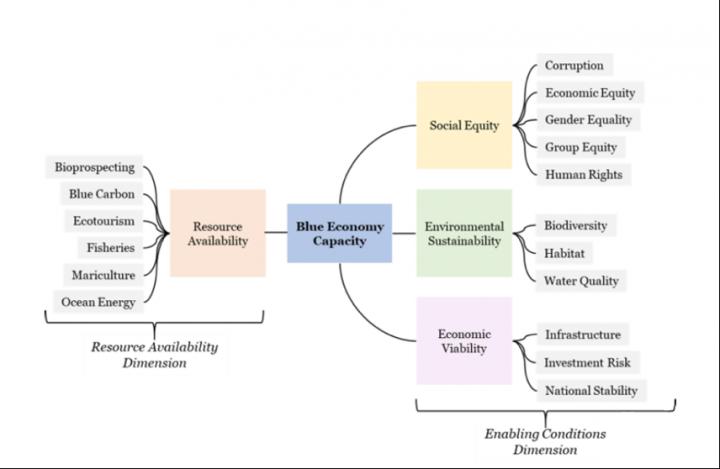
Credit: Andres Cisneros-Montemayor
The future of an equitable and sustainable global ocean, or “Blue Economy,” depends on more than the resources available for technological advancement and industry expansion. A recent UBC-led study found that socioeconomic and governance conditions such as national stability, corruption and human rights greatly affect the ability to achieve a Blue Economy.
The study, published today in Nature, scored criteria across five global regions: Africa, Americas, Asia, Europe and Oceania, to identify the areas of investment and research necessary to develop ocean resources in a manner that is consistent with a Blue Economy ethos (socially equitable, environmentally sustainable and economically viable). These included: infrastructure, investment, economic and group equity, gender equality, human rights, biodiversity, habitat, water quality, corruption, and national stability.
“We found that there are considerable differences between regions, where some are focused primarily on resources, whereas others are really trying to make sure that development is meeting local social and cultural objectives,” said lead author Andrés Cisneros-Montemayor, research associate for the Institute for the Oceans and Fisheries at the University of British Columbia and deputy director of the Nippon Foundation Ocean Nexus Center. “For all countries, including Canada, the most important question we need to be asking is, how are we going to make sure that we develop those resources in ways that actually benefit local communities? Otherwise we’re back to business-as-usual, where only a few benefit from ocean resources. This is what the Blue Economy is trying to change.”
As natural resources are widely but unevenly distributed across the oceans, many areas will be unable to competitively develop multiple sectors. It is, therefore, important to choose and manage sectors carefully, as development for sectors like ecotourism, fishing, mariculture, or others, can be important at local scales but may not be ecologically sustainable or socially desirable at larger scales. Ocean-based development plans for Asia and Europe, for example, do prioritize mariculture and tourism, but also sectors such as shipping, port construction, and large-scale ocean energy projects which have potential for economic growth, but unclear benefits for local communities. Oceania, on the other hand, has prioritized community objectives, traditional resource uses, and emerging sectors that can be developed in accordance with local goals. In other words, more focus on developing and transforming their ocean economies to advance equity and sustainability.
“Canada is in a great position to be a leader on this, with coastlines on three oceans and a lot of local knowledge and capacity to develop sectors carefully,” said Cisneros-Montemayor. “It is currently in the process of developing it Blue Economy plan, yet, we are now seeing that the draft, which at the time our study was just being prepared, is very much focused on new technologies. Yet, as a nation, Canada has very publicly focused on equity, inclusion and deeper issues such as Indigenous reconciliation. We have to make sure that those national priorities are fully part of Canada’s Blue Economy strategy and create an example that others can learn from. And yet these priorities are not currently reflected in its Blue Economy draft. What is happening in the oceans is not fundamentally different than the issues happening at a national level.”
“History has taught us that having rich natural resources does not necessarily support sustainable development, and this applies to ocean economies as well” said William Cheung, co-author on the paper, professor in the Institute for the Oceans and Fisheries and Canada Research Chair in Ocean Sustainability and Global Change). “Global and local investment in the blue economy needs to prioritize in enhancing knowledge and their accessibility, developing appropriate and effective governance, improving social equity and reducing risks to the ocean such as from biodiversity loss and climate change.”
###
“Enabling conditions for an equitable and sustainable blue economy” was published today in Nature.
Media Contact
Katherine CAME
[email protected]
Original Source
https:/
Related Journal Article
http://dx.




